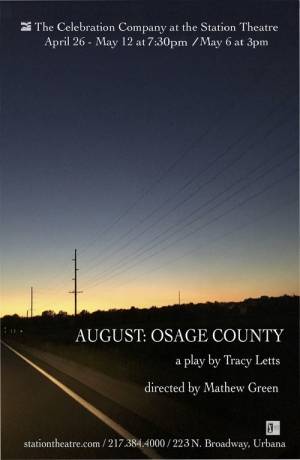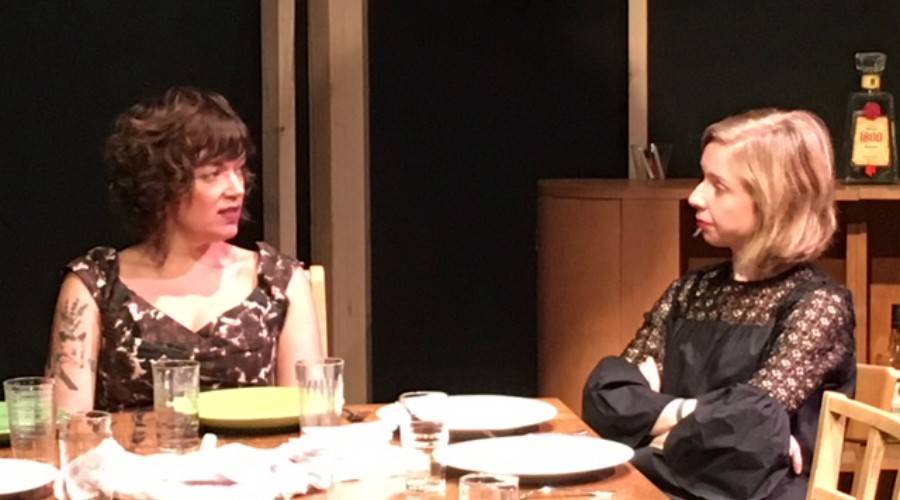Family. Loss. Heartbreak. Dysfunction. Wrestling with the person one has become versus who one wanted to be. All parts of life we all have experienced. All wrapped up with a very untidy bow in August: Osage County. Directed by Mathew Green (who in the past has directed The Crucible and Marjorie Prime), August: Osage County focuses on the Weston family in Osage County, Oklahoma during the immediate aftermath of the disappearence of the family partriarch Bev. We ultimately experience their dysfunction firsthand.
To get a little more insight into this show, I recently sat down with director Mathew Green along with cast members Carolyn Kodes (playing Mattie Fan Aiken), Keilah Wilson (Jean Fordham), and Matt Hester (Bill Fordham).
 Smile Politely: I’ll lead off with the same question I ask every director, and actor. For those that are not familiar with August: Osage County, how would you describe the show?
Smile Politely: I’ll lead off with the same question I ask every director, and actor. For those that are not familiar with August: Osage County, how would you describe the show?
Mathew Green: August: Osage County is a darkly comic modern drama about a family coming together in a time of crisis. The family patriarch—who was once a celebrated poet—has disappeared, and so the adult daughters return home with their families and… well, baggage.
Carolyn Kodes (Mattie Fae Aiken): A modern Long Day’s Journey into Night. A dysfunctional family drama with lots of dark humor.
Matt Hester (Bill Fordham): I think it’s a story we all can find little pieces of ourselves in. And that’s what I like about it. Hopefully not everyone has a family as dysfunctional as this. But we all have those little elements. The arguments between siblings and parents. And the different relationship dynamics. There’s no good person or bad person. Just flawed people.
Keilah Wilson (Jean Fordham): It’s very intense. There’s definitely a lot of family drama that you don’t expect, but, I don’t know, there’s definitely something about it that makes it feel so real. At the end of the day I think these people do love each other, but it’s like what else can you do.
SP: Mathew, what do you feel is special or different about A:OC compared to past shows you have directed?
Mathew Green: That’s tricky, because I’ve almost exclusively directed plays that mean a lot to me. In the case of August: Osage County, I suppose what sets it apart is the number of story threads that run through it. Lot of balls to juggle.
SP: It seems that you have a penchant for shows that lend themselves to character studies or very real human experiences. What is about shows like Marjorie Prime or The Crucible or August that draws you to them?
Mathew Green: I like shows that require an investment on the part of the audience. I like knowing that the story we’re telling has the potential to move someone or make them think, whether it’s about their community or their country or themselves. These shows also lend themselves—usually—to naturalistic performances, subtlety, silence. I’d rather have an audience lean in and empathize than lean back and observe.
SP: August is the second show you’ve directed in a row that has a large cast. How does this experience differ from directing shows such as Marjorie Prime, which has fewer characters?
Mathew Green: The first rule is to tell the story as honestly as possible. So, whether I have a cast of 4 or 14, my approach to directing is the same: I’m there to help the actors find their most truthful performance and then blend those performances into a cohesive whole. The only difference, with a larger cast, is scheduling—directing the flow of traffic. Luckily, I’m married to the most badass stage manager in town.
SP: Carolyn, how does it feel to play someone completely opposite of your personality? Or contrary to your own personality?
Carolyn Kodes: It is delightful. Mattie Fae does things, and I guess I do things as Mattie Fae, that I would never do and I can say things I would never say. She’s delightfully vicious in a lot of ways, and just cutting and with the intent to hurt. Intentionally cruel. And there’s something rather delightful about that when you don’t do it on the regular.
SP: So much like the joy the comes from playing a villain?
Carolyn Kodes: Oh definitely. She’s completely a villain. It’s not that she’s not a good person. I think she’s a good person. But yes, in a way she’s a villain of the piece.
Smile Politely: Why should the community attend this show in particular? How can the audience relate to the show?
Carolyn Kodes: I think there is a lot they can find. Regret, and what regret can do to you. The arc of a life, and how we start out so hopeful. And we sometimes end up as people we didn’t expect to be. But even more simply that that, everyone is going to know someone like this in their family. Everyone is going to look at one of these characters and say: “Oh! That’s like cousin so and so. That’s like my uncle.”
Matt Hester: I remember seeing this show a couple of years ago when another group did it, and remember thinking when the show was over that I thought it was supposed to be a long show. And I looked at my watch and could not believe three hours had gone by. That’s hard to do no matter how good it is. But with this particular show, everyone can relate to all of the characters. You can see pieces of yourself. Pieces of someone you love. Pieces of someone in your family you can’t stand, but you still love.
Keilah Wilson: Personally, having been a teenager not too long ago, Jean’s character is dealing with a lot of pressure and is trying to get attention. There’s times when you want to get attention. And there’s times when you do things you’re not proud of at the end of the day, because you realize they’re not the best thing. But it’s a learning experience. And I think that’s something a lot of adults and teenagers can take home with them.
_________________________________________________________________________
August: Osage County opens at The Station Theatre on Thursday, April 26 (opening night is sold out). For more information and to reserve tickets click here.
Header photo by Mathew Green. Poster image from Sation Theatre website.








